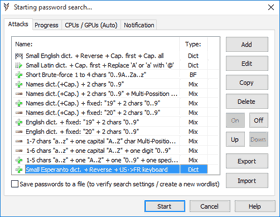Zip Password Recovery
Zip Password by Thegrideon Software is a feature-rich password recovery tool for ZIP, PKZip and WinZip (*.zip, *.zipx) archives with a very flexible search range setup. It works with legacy and still common Zip 2.0 as well as with modern AES encryption methods. Password recovery basics are covered in Password Search FAQ.
Zip Password Recovery Features:
- Several password search attacks can be configured and queued:
- advanced mixed attacks for precise search range setup:
- multi-position moves to cover modern password policies;
- simple modifications: add part(s) copy, replace chars, etc.
- typing errors, case switching, char substitutions;
- brute-force attacks based on a charset and length selected:
- limit number of equal, capital or special chars or digits;
- dictionary attacks with modifications (several wordlists are included):
- advanced keyboard layouts-aware recovery technique;
- password in reverse, capitalized, uppercased, lowercased;
- number ranges (e.g. 1-31, 01-12, 2013-2020, etc.);
- "Output attacks to a file" option to verify search settings or to generate a new wordlist, etc.
- Highly optimized code (SSE, AVX, AVX2, AVX-512) guarantees best performance.

- Utilizes NVIDIA and AMD Graphics processing units with high-performance methods.
- Supports up to 64 simultaneous processing threads (multi-CPU, multi-GPU).
- Audio, script or web address based post-search notification.
- Windows 7 - Windows 11.
zip 2.0 (legacy and still very common):
There are two steps in a password search: password generation and password verification. Zip Password is designed for precise and flexible search range setup with mixed attacks, etc. And for Zip 2.0 password generation capability is usually a speed limiting factor, therefore password verification is CPU based only. Password recovery speed is also affected by several factors, such as number and size of files, compression method used, etc.
| CPU: |
|---|
| Speed: |
| Intel® Core™2 Duo T7500 @ 2.20GHz |
Intel® Core™ i3 2100 @ 3.10GHz |
Intel® Core™ i3 4130 @ 3.40GHz |
|---|---|---|
| > 20 000 000 p/s | > 40 000 000 p/s | > 50 000 000 p/s |
AES-128, 192 and 256 bit encryption:
The protection methods are based on PBKDF2 and AES algorithms, thus recovery speed is limited, but we did our best to enhance this tool performance as well as recovery speed with some advanced methods. The final password recovery speed is equal to CPUspeed + GPU(1)speed + ... + GPU(N)speed.
For example .zipx (AES-128) password recovery speed on Intel i3 + AMD Radeon R9 270 = 51 000 + 650 000 = ~700 000 p/s (passwords per second).
| CPU: |
|---|
| Instructions: |
| Speed: |
| Intel® Core™2 Duo T7500 @ 2.20GHz |
Intel® Core™ i3 2100 @ 3.10GHz |
Intel® Core™ i3 4130 @ 3.40GHz |
Amazon EC2 "c5.large" Xeon® Platinum core |
|---|---|---|---|
| SSE2 | AVX | AVX2 | AVX512 |
| ~11 000 p/s | ~24 000 p/s | ~50 000 p/s | ~63 000 p/s |
AMD and Nvidia GPUs
Compute units or stream multiprocessors (CU, SM, SMX, SMM) are the main building blocks of GPU calculation power, thus 32xCU GPU card is usually twice as fast as 16xCU GPU card of the same family and architecture running at the same frequency.
You can expect approximately 50k-80k p/s performance per every Nvidia SM running at 1GHz and approximately 30k-40k p/s per every AMD CU.
| GeForce GT 640 2xSM, 1050 MHz |
Tesla K80 13xSMX, 820 MHz |
Tesla V100 80xSM, 1250 Mhz |
|---|---|---|
| + 135 000 p/s | + 750 000 p/s | + 5 000 000 p/s |
| 135000/2/1.05=65000 | 750000/13/0.82=70000 | 5000000/80/1.25=50000 |
| HD 6770 10xCU, 850 Mhz |
R9 270 20xCU, 950 MHz |
RX 480 36xCU, 1260 MHz |
|---|---|---|
| + 350 000 p/s | + 650 000 p/s | + 1 600 000 p/s |
| 350000/10/0.85=41000 | 650000/20/0.95=34000 | 1600000/36/1.26=35000 |
It is important to mention that AMD and NVIDIA architectures are quite different and although AMD per CU performance is lower, there are more CUs per card in a similar price range. Moreover GPU performance is somewhat variable with number of factors including GPU/CPU combination and even a driver version. Please contact us if your recovery speed is noticeable different from the data above.
Trial version can be used to check format and hardware compatibility. It allows you to setup and test run any password search for up to 15 min per set. Recovered passwords are hidden behind the asterisks.
All trademarks are the property of their respective holders.


